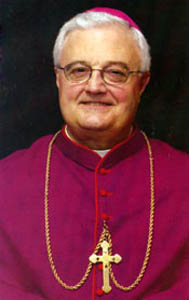Here's an unpaid, non-political message from the bishop:

Soon the citizens of our country will have the opportunity to cast a ballot for the presidency. For the past almost two years campaigns have been revving up and the climate of politics has turned uncivil. This is most unfortunate and I imagine our founding fathers would be quite amazed and appalled at how we have progressed or perhaps regressed in the political arena.
Truly it is an honor and a privilege for us as Catholics and citizens of the United States to cast a vote. Not only is it an honor and a privilege but it is also a right and a responsibility to participate in our collective civic life by voting.
Every four years the United States Conference of Catholic Bishops (USCCB) develops a document to assist Catholics in forming their consciences in order to make educated decisions in the voting booth. This year’s document is entitled: Forming Consciences for Faithful Citizenship: A Call to Political Responsibility from the Catholic Bishops of the United States.
In its introduction the document states: Forming Consciences for Faithful Citizenship is widely used to share Catholic teaching on the role of faith and conscience in political life. Although it has at times been misused to present an incomplete or distorted view of the demands of faith in politics, this statement remains a faithful and challenging call to discipleship in the world of politics.
It does not offer a voters guide, scorecard of issues, or direction on how to vote. It applies Catholic moral principles to a range of important issues and warns against misguided appeals to ‘conscience’ to ignore fundamental moral claims, to reduce Catholic moral concerns to one or two matters, or to justify choices simply to advance partisan, ideological, or personal interests.
It does not offer a quantitative listing of issues for equal consideration, but outlines and makes important distinctions among moral issues acknowledging that some involve the clear obligation to oppose intrinsic evils which can never be justified and that others require action to pursue justice and promote the common good.
In short, it calls Catholics to form their consciences in the light of their Catholic faith and to bring our moral principles to the debate and decisions about candidates and issues.
The document further explains: Some question whether it is appropriate for the Church to play a role in political life. However, the obligation to teach about moral values that should shape our lives, including our public lives, is central to the mission given to the Church by Jesus Christ.
Moreover, the United States Constitution protects the right of individual believers and religious bodies to participate and speak out without government interference, favoritism, or discrimination. Civil law should fully recognize and protect the Church’s right, obligation, and opportunities to participate in society without being forced to abandon or ignore its central moral convictions.
Our nation’s tradition of pluralism is enhanced, not threatened, when religious groups and people of faith bring their convictions and concerns into public life. Indeed, our Church’s teaching is in accord with the foundational values that have shaped our nation’s history: ‘life, liberty, and the pursuit of happiness.’ (#11)
Surely public issues such as abortion, embryonic stem cell research, immigration, capitol punishment, and war have strong moral dimensions. The moral voice of religious leaders is paramount to forming the conscience of our nation. Indeed our country through its tradition of diverse religious faiths is enhanced and enriched when these faiths contribute their values to civic life and public debate.
Therefore, each individual Catholic should be well-versed in the moral and ethical implications of issues of public policy and proposed legislation so that he or she will be able to make informed choices at the ballot box and be a more active and faithful citizen. Faithful citizenship is good stewardship of one’s religious values.
For the Catholic Church, faithful citizenship is based in moral principles not the platform of any one political party. These moral principles are rooted in Scripture and Catholic social teaching.
The principles focus on some very fundamental ideals: the life and dignity of the human person, the call to family and community, the rights and responsibilities that come with freedom, the option for the poor and vulnerable in our midst, solidarity with the suffering, and caring for God’s creation.
Catholics should take quite seriously the right to vote and participate in public life. In following the principles listed above, individuals are better able to contribute to the overall common good of the entire community and not just reflect one’s own personal interests.
I urge all Catholics to study the entire Forming Consciences for Faithful Citizenship statement at www.faithfulcitizenship.org. I also entreat all Catholics to remain respectful and civil with our neighbors.

